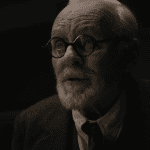
I really liked Suncoast, a quirky coming-of-age dramedy hitting Hulu tomorrow. This semi-autobiographical dramedy from writer/director Laura Chinn, has some great performances and real heart behind it. And I especially liked how it dealt with two oft-entangling issues: cultural warfare and quiet faith.
And it uses one of the biggest flashpoints of America’s so-called culture wars as its anchor. [Warning: The following contains some minor spoilers.]
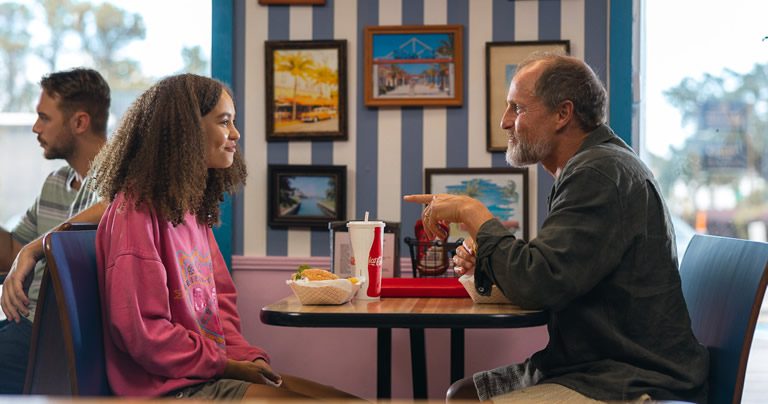
‘Every Life is Precious’
Right off the bat, Suncoast introduces us to Doris (Nico Parker), a 17-year-old girl living in Clearwater, Florida, in 2005. Her brother, Max, is dying brain cancer, and for years he’s been in a near vegetative state—unable to walk or talk and (Doris believes) unaware of the world around him.
Doris and her mother, Kristine (Laura Linney), have been caring for Max for years, and both have been twisted plenty by the experience: Kristine has given so much time and energy to her son that she’s nearly forgotten about her daughter. And much of Doris’ own tween and teen years were sacrificed in turn. She’d love to be a normal teenager, but she even know what “normal” looks like.
But Kristine and Doris can’t care for Max all alone anymore. It’s time to move him to Clearwater’s Suncoast hospice, where he can spend his last remaining weeks.
But that hospice center holds another, more famous resident: Terri Schiavo, center of a raging debate over euthanasia and disability rights.
For those who might not be familiar with Schiavo, she was a real person. In 1990 at the age of 26, she suffered massive brain damage (due to cardiac arrest) and slipped into what doctors called a persistent vegetative state. Eight years later, Schiavo’s husband petitioned the courts to remove her feeding tube—a move blocked by Schiavo’s parents. It opened a seven-year legal battle over the young woman’s fate—a battle that was nearing its end as the events of Suncoast begin.
Schiavo’s case attracted a lot of national attention, and the Suncoast hospice is protected by police and surrounded by protesters. One of those protestors—Paul (Woody Harrelson)—meets Doris by chance, and they soon find themselves talking.
It seems that Paul’s a Christian. The fact that he’s there, trying to stop the courts from removing Schiavo’s feeding tube, marks him as something of an activist, too. He calls Suncoast “that executional chamber” and tells Doris repeatedly that “every life is precious.”
The film could’ve stopped with its character development there. But instead of turning Paul into a stereotypical conservative culture warrior, as many a film might’ve done, Suncoast goes deeper.
We learn that Paul lost his own wife to a brain aneurism. And when Doris talks about how she wishes her brother would just pass on—how he’d be happier and she’d be happier—Paul tells her to not be so quick to wish him away. She doesn’t know the vacuum such a loss can leave; she’ll even miss taking care of him.
“You’ll miss everything,” Paul says. “All the good, all the bad. Hell, especially the bad. I’d give anything to hear my wife yell at me for letting the mosquitos inside. Just to hear her, you know?”
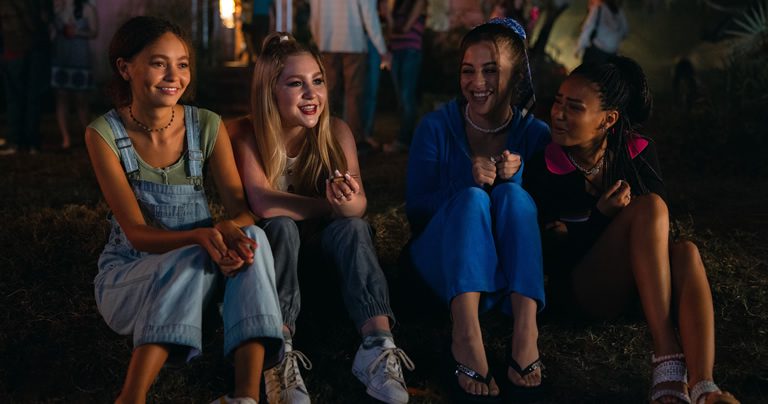
Digging Deeper
Some reviewers have called Paul’s role here as something of a subplot. But for me, his friendship with Doris really forms the core of the story here. Doris’ dad died when she was 3. Her mom barely pays attention to her. Paul becomes really the only responsible adult in Doris’ life—and when Doris starts hanging out with a very fast crowd, he’s sometimes the only tether that keeps Doris from flying off a metaphorical cliff. He’s not just a guy shouting in the background during the evening news. He’s grieving. He’s passionate about the preciousness of life. And in Doris, he sees someone who could use a little bit of friendship. Maybe a little bit of hard-earned wisdom.
And for Suncoast’s viewers, Paul does something else, too: He reminds us that whatever we might initially think of the people we meet in the story, they’re all people. They’re complex. Complicated. Characters we might be inclined to stereotype take on new dimensions if we listen to them, give them a chance.
Kristine judges everyone harshly, from the “plastic nurses” to the unfeeling policeman guarding Suncoast. But the policeman is far from unfeeling, and the nurses prove to be just as flesh-and-blood as anyone. Doris’ often shallow friends feel initially like cookie-cutter mean girls, always looking forward to the next party. But they’re deeper than the movie lets on, and their friendship with Doris is real, too. Kristine, in some ways, is one of the easiest characters to write off at first. She makes it easy to do so, given how brittle and angry she is. But as Max’s death creeps closer, Kristine gets softer. Just like us, she’s been twisted by pain.
She tells a grief counselor about what it felt to give birth to Max, to think about what her first child would bring to her life. “Now, I’m waiting for him to leave, and I wonder what he’s going to take from my life,” she says. And (thanks to Linney’s strong work) we feel Kristine’s fear in that moment. Her pain. Her grief. The anger slips away.
And as that fury fades, something else takes its place: A hint of faith.
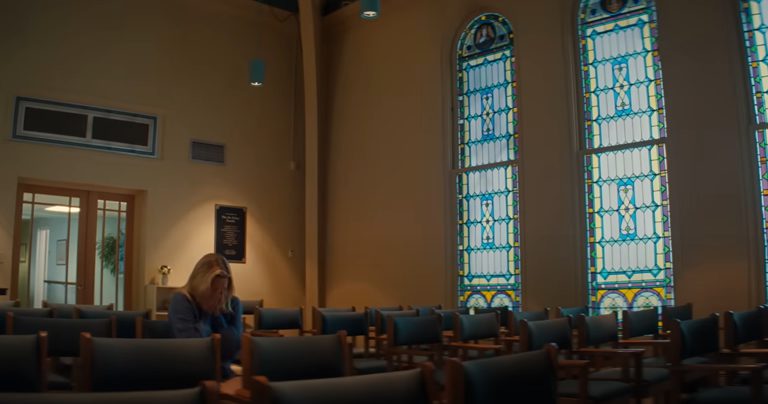
Grief and God
When Paul begins to talk with Doris, he notices she’s wearing a shirt from her private Christian high school. He asks her if she’s Christian.
“No, not exactly,” Doris says. “My mom thinks that religion is b—sh–. No offense.”
But Kristine, in her most vulnerable moment, finds herself in Suncoast’s chapel. And for the first and last time, we see her cry. From then on, her appearances on screen are notable for Kristine’s gentleness, not brittleness. She’s at peace with herself, not at war with everyone else. And she expresses a belief that the dead don’t truly leave. They’re still around. They can still hear you.
And Doris can feel that sense of continuity, too.
“He died,” Doris tells Paul at the end of the film. “And it feels just like you said. But I think—I know—that he’s in a better place now. I know he’s happier. He’s free.”
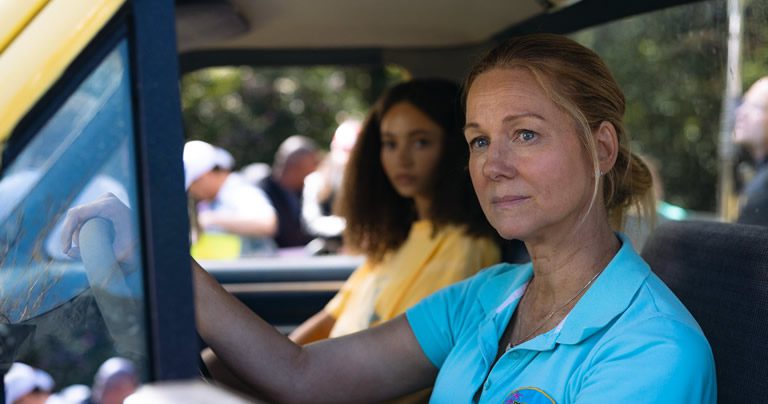
Knowing is Half the Battle
One of my favorite parts of Suncoast takes place in a classroom. Students in what appears to be a high school Christian ethics class are discussing the Terri Schiavo case—debating whether Schiavo has a “right to die” or whether her husband has the right to pull the plug on her. When one of the students lets slip that Doris has an intimate familiarity with such issues—that her brother is in the very same hospice as Schiavo—all eyes turn to her, and she’s asked what she thinks.
“You can’t really answer those questions because you don’t know,” she says. “You don’t know what’s right or wrong until it happens to you. Like, we can say Terri’s husband is a monster for wanting to let her die, or her parents are monsters for wanting her to live. But we don’t know, do we? Because we’re not them.”
I don’t think Doris is completely on point here. She suggests that we can’t know what’s right until we have a hands-on, intimate understanding of the issue. But that suggests that right and wrong is subjective, because when something “happens to you,” you might think and feel and act differently than I would. I believe that God’s who we must rely on to understand right and wrong, because our own thoughts and feelings can be pretty fickle.
But she hits on something else here—something important. Because in the context of the narrative, we don’t know. We don’t know why Paul was on that picket line unless we asked him. We don’t know the depths of Kristine’s sorrow and pain. We don’t know the sorrow and anguish and doubt that maybe Terri Schiavo’s husband and parents felt in trying to decide her fate.
Suncoast understands that—which is why it focuses so much on bypassing stereotypes and getting to know the people underneath. Real justice and real grace start with knowing. It involves looking someone in the eye. It involves way more listening than it does talking. We don’t have to agree, but I think that, at our best, we must try to understand.
Suncoast knows its own characters. And that makes it, in spite of its problems and shortfalls, a worthwhile watch.


